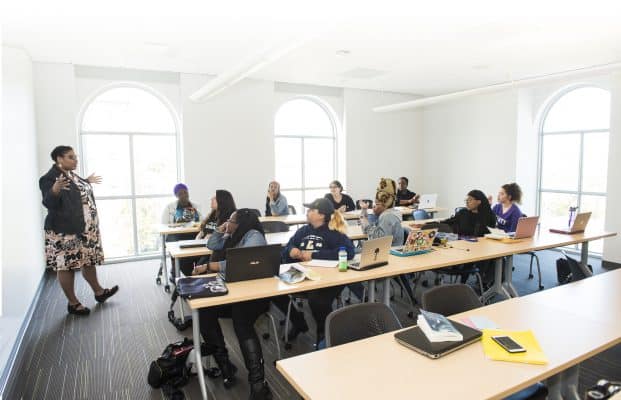Teaching & Learning
Ann Pauley
 “I feel more confident as a scholar when I am in the Payden Academic Center,” says Yarely Rodriguez. As a biochemistry major, she appreciates the pristine labs and state-of-the-art science equipment. Yet, it is the greater sense of confidence that she values most each time she steps into the lobby.
“I feel more confident as a scholar when I am in the Payden Academic Center,” says Yarely Rodriguez. As a biochemistry major, she appreciates the pristine labs and state-of-the-art science equipment. Yet, it is the greater sense of confidence that she values most each time she steps into the lobby.
“I like the brightness and energy as soon as you walk in,” says Heidi Fuentes, a sophomore majoring in psychology with a minor in education. “In my education classes, we discuss how the learning environment makes a difference and I can see that here in the Payden classrooms. The lobby is a great space to get together with friends and study.”
The positive impact of the light is a frequent response when students and faculty are asked about the experience of learning and teaching in the Payden Academic Center – from the light-filled lobby to the floor-to-ceiling windows in the classrooms.
Fuentes also likes the water fountains designed for students to refill their own bottles. “There’s a counter on each one and it tells you how many disposable plastic water bottles are not being used,” she says. “We’re learning about climate change and how it’s the little things that add up to make a big difference.”
The Payden Academic Center is Trinity’s first LEED-certified building, which means it is a green and sustainable structure. The water bottle filling stations, large windows, motion sensors and climate controls are among the many elements factored into its LEED certification.
“I love the space in the Payden classrooms,” notes Dr. Rewa Burnham ’05, assistant professor of English. “I like to move around the classroom as I teach,” says Burnham. “I can engage more directly with each student, connect with the students in the back row and be sure everyone is participating in the conversation. I love the historic feeling in Main Hall, but here in Payden, the space in the classroom really enhances my teaching style and I think makes the classroom discussions richer.”
Burnham has a unique perspective, as a Trinity graduate who took almost all of her classes in Main Hall, returned to campus as an instructor while she completed her doctorate in English, and is now a full-time member of the English faculty.
Burnham also appreciates the way that each classroom has “technology that always works, so I don’t even need to think about it. That way, I can integrate video and so can the students.”
Burnham demonstrates this as she leads her class in a discussion of Toni Morrison’s novel, Love. She’s at the front of the class, asking her students questions and writing on the whiteboard. “Now, let’s hear Toni Morrison in this interview with Charlie Rose.” She has the video clip queued up and flips it on. She steps to the back of the classroom as the students watch and listen. She turns off the video and asks her class, from the back of the room, “What is the point that Toni Morrison is making here?” The students are engaged and focused.
Dr. Kelley Wood, assistant professor of business and management, who teaches at both the undergraduate and graduate level, values the flexibility of the classrooms. “With the tables and chairs on wheels, it’s very convenient to have the students quickly break into small discussion groups, then return to the full classroom set-up,” he says.
“The classrooms are very conducive to the way we teach,” says Dr. Deborah Haskins, assistant professor and director of Trinity’s graduate counseling programs. “In counseling, it’s all about the relationship and how we engage each other. We set up the classroom in a square so that all of the students can see each other. We can easily configure the classrooms for our group counseling courses – we have the flexibility to convene two groups in the same space.”
Four counseling rooms provide students with the opportunity to practice their one-on-one counseling skills. “The students video their sessions and then they watch them and write a reflective analysis of their role as a counselor,” Haskins explains. “They show the video to the class and get feedback from their peers and then the professor provides an assessment. With each session, the students gain confidence and we see their counseling skills improve.”
“This space is such a wonderful gift to us as students,” says Ikea Mititelu, a senior business major. “The natural light, the technology in every classroom, the comfortable spaces where we can study – that all makes such a positive difference. We are so grateful that the Trinity community made this investment in us.”
The Honorable Barbara Kennelly ’58, distinguished professor of political science, smiles as she reflects on how students respond so positively to the Payden Academic Center.
“There’s a sense of respect among the students,” she says. “Trinity students are very proud to be here. They are very aware of how special this space is and how this is a reflection of our confidence in them.”